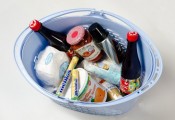The new food waste law would close the social shops in the country and leave hundreds of families in Bucharest and Sibiu without the only source where they can buy food at lower prices.
If it is voted next week, the new law on food waste reduction will close the social shops and leave hundreds of families in Bucharest and Sibiu without the only source where they can buy food at low prices. At the same time, this new legislative proposal does not impose any obligation on food companies to reduce waste. All measures remain optional.
Several months ago, the Agriculture Committee discussed to amend law 217/2016 on the reduction of food waste. After several months of discussion, on the agenda of the Chamber of Deputies will most likely come next Wednesday a draft law that:
- It prohibits the resale of donated products, including by social shops.
- It does not impose any obligations on companies in the food industry to reduce waste. All proposed measures are optional.
The first effect of this law will be lost to those few social shops in Romania and the impossibility of others to appear. Such a social shop is Asociația SOMARO – Magazinul Social. From here you can supply people at the poverty line, beneficiaries of the General Directorate for Social Assistance. Given that the law will prohibit the sale of donated products, this store, and so on, will close. The 819 families of SOMARO social shops in Bucharest and Sibiu (families in poverty) will lose the opportunity to buy products at extremely low prices (about 15% of their real value).
Social shops and other similar social economy structures are not profitable. The sale of products ensures, often only partially, the subsistence of the shop. In addition, selling products at prices that people with extreme poverty can afford, help the beneficiaries to retain their dignity, being treated as customers.
Throughout the world, states are investing in such solutions that help both to reduce food waste and to reduce poverty. (for example, SOMA social shops in Austria, Not-for-profit Grocery Markets in Canada, Croix-Rouge Buttek social shops in Luxembourg, CARITAS MARKT social shops in Switzerland, etc. In 2013, there were over 1,000 shops in Europe only!). In Romania, the state forbids them.
Throughout the debates in the Committee on Agriculture, the representatives of the food industry companies have resisted the obligations the original draft imposes, not wanting to take any responsibility for diminishing food scarcity. In the same way, they opposed the possibility of social shops to sell the products received, although any donor company could have decided what kind of organization they donated and under what conditions.
All this, according to Eurostat, in Romania:
- 38.8% of the population at risk of poverty or social exclusion – the second largest in the EU
- 23.8% of the total population of Romania are affected by severe material deprivation
- 18.9% of employees are at risk of poverty
The group of organizations against food waste will ask Members to amend the bill once it reaches the plenary agenda, so that its provisions are not optional, but mandatory, and social shops will be exempted from the ban on re- sells premium products as a donation.
Contact:
Simon Suitner, General Manager Somaro // simon@somaro.org // 0722.454.314
Silvia Boeriu, Communication Coordinator CeRe: Centrul de Resurse pentru participare publică // silvia@ce-re.ro // 0721.215.260
 by donating products
by donating products by donating money
by donating money by donating time
by donating time



